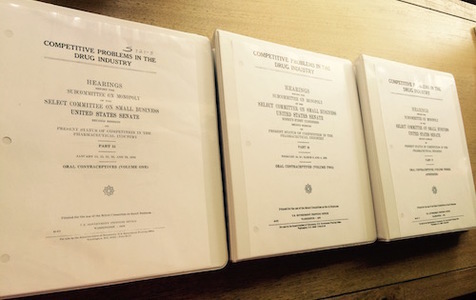When I took this job—combing through the Nelson Pill Hearings, researching and writing about the risks with hormonal birth control, working on the Real Risk study—my mother said to me, “Are you sure you want to do that? Are you sure you want to dig up all that stroke stuff?”
“Mom,” I said, a little exasperated. “It’s been 10 years. I’m fine with it.” Duh was close to what I was thinking but didn’t say. The weird thing is, my mom may have been right. Okay, that’s not entirely fair. My mom WAS right. (NEWSFLASH: My mom is right sometimes!) This job has been hard, and not just because reading congressional testimony is draining and because I’m so passionate about this work. It has been hard because it has forced me, nearly every day since November, to examine what happened to me.
I had a stroke because of hormonal birth control and for a long time I believed my doctors (and much of the research I found when writing my thesis) when they said that I was special. That this sort of thing didn’t happen much. Because I thought I was an anomaly, I was able to bury my head comfortably in the sand and call that “dealing with it.”
It hit me that I had not been dealing with it when I sat in a room with Karen Langhart and the parents of four other young women who had died while using hormonal birth control. As they shared their stories, tears slid down my face. I knew I was not an anomaly. It could have easily been my mom sitting in that room and not me.
I’ve written about how important it is to share patient stories. And we’ve written about the importance of the Real Risk Study. I’ve participated in the study. I’ve written my story (all three parts of it: Part 1, Part 2, Part 3). But it has not been easy for me. Which means it has taken unfathomable courage and strength for the families who have lost their daughters. I had to face a sadness that was buried deep under a layer of “getting on with life.” But for these families, the sadness isn’t buried because there is no “getting on with life.” It’s right there, out in the open, raw and exposed. Their lives will never look remotely the same.
When we publish an article about a health crisis or a death related to hormonal birth control it is not because we are alarmists. It is not because we are whiny or dwelling in the past. It is because this work is important. This study is important. I was not an anomaly. The young ladies who were killed by hormonal birth control are not anomalies. They are daughters, wives, sisters. They could be you or someone you love. We share because we are not alone. We are a group of survivors and advocates.
One of the most amazing things that has happened to me from taking this job is that, despite the challenges, it has helped give meaning to what happened to me. I’ve met and connected with amazing people. While much of it has been cloaked in sadness, the thing that shines even brighter in these interactions is hope. And hope is healing. By sharing my story and participating in this research, I am feeding that hope.
It is my wish that you will help feed that hope, too. If you are a survivor of a blood clot or a family member of someone killed by a blood clot and you have been hesitant to participate, now is the time. If you aren’t, I guarantee that you know someone (a friend or relative or a friend of a friend) who has been affected by a blood clot while on hormonal birth control. Now is the time to share this link. Because there is hope in sharing. And healing in hope.
Real Risk Study: Birth Control and Blood Clots
Lucine Health Sciences and Hormones Matter are conducting research to investigate the relationship between hormonal birth control and blood clots. If you or a loved one have suffered from a blood clot while using hormonal birth control, please consider participating. We are also looking for participants who have been using hormonal birth control for at least one year and have NOT had a blood clot, as well as women who have NEVER used hormonal birth control. For more information or to participate, click here.








